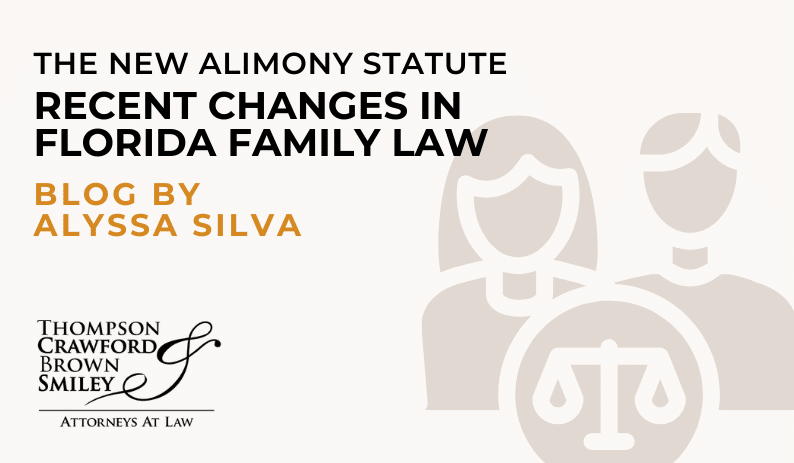
When seeking a dissolution of marriage, a major cause for concern is alimony. It is important to note that as of July 1, 2023, the new alimony reform bill has taken effect. This bill changed major points of Section 61.08, Florida Statutes, regarding alimony. It is important to understand the most notable changes to the law before going forward with the process.
- The new law eliminates permanent alimony going forward. There are now four types of alimony that can be awarded in a dissolution of marriage case:
a. Temporary Alimony – an award of alimony for the duration of the dissolution of marriage proceeding.
b. Bridge-the-gap Alimony – an award of alimony that provides support to a part making the transition from married life to single life. The length of the obligation cannot exceed 2 years.
c. Rehabilitative Alimony – an award of alimony meant to provide support for the party while he or she is becoming self-sufficient, i.e. finishing school, career training, gaining work experience, etc. The cap on Rehabilitative alimony is now 5 years.
d.Durational Alimony – an award of alimony which offers a party economic assistance for a set period of time dependent on the length of the marriage. - Further, the new alimony law changes two major aspects of durational alimony:
a. Firstly, it adjusts the cap on alimony terms for durational alimony. The updated criteria is that for a short term marriages (3 to 10 years), durational alimony payments cannot exceed 50% of the length of the marriage; for a moderate-term marriage (10 to 20 years), payments cannot exceed 60% of the length of the marriage; and for long-term marriages (over 20 years), payments cannot exceed 75% of the length of the marriage.
b. Secondly, it adjusts the formula to determine the amount of durational alimony payments, which are to be determined to be the receiving party’s reasonable need, or an amount not to exceed 35 percent of the difference between the parties’ net incomes, whichever amount is less. - Lastly, beware of “supportive relationships,” or cohabitation, the Court can reduce or terminate the paying party’s alimony obligation if the payee is found to be in one of these relationships.
Navigating a dissolution of marriage can be complicated, so it is always important to consult with an experience Florida family law attorney when beginning this process.
